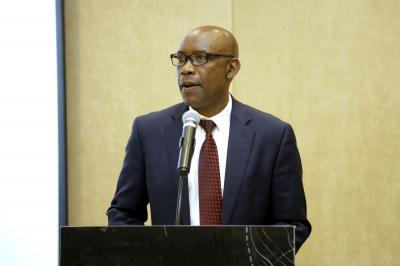
By Gerald Mbanda
There have been persistent recycled claims by western sources, that China installed computers, listening devices and cameras in the African Union headquarters for the purpose of stealing secrets and influencing African leaders to support Beijing’s global agenda. The first lie that can be exposed here, is: why should China with good diplomatic relations with the AU resort to secret acquisition of information that they can easily get through the normal channels?
Recent claims have been published by The Heritage Foundation, reproducing the same article that had been published by another US organization called The National Interest. What the publishers ignore to know, is that the more they publish such false claims about China, the more their deception and malicious intentions are exposed and the failure of the US foreign Policy on Africa laid bare.
In 2018, the AU chairperson Mousaa Faki Mahamat refuted claims of the China spying allegations that had been published by a French newspaper Le Monde. In his own words, he said that these were, “totally false allegations” reiterating that ties between China and AU are “unwavering”, and such reports could not damage their relations.
https://www.news24.com/news24/africa/news/african-union-head-calls-china-spying-report-lies-20180208
The US chief technology officer Michael Kratsios while speaking at a technology conference in Lisbon on 7th July 2019, called on European countries that they “must take a stand with America” which imposed controls on Huawei and argued EU countries abandon the Chinese products. Kratsios is said to be the man behind shaping US policies on technology and data. The arrest of a top Huawei executive Ms. Meng Wanzhou in Vancouver in 2018 by Canadian authorities backed by US, is believed more to be a technology and trade war affair than a security issue as Canada and US want the world to believe. The CEO of Huawei was quoted saying that, “his daughter should be proud she became a ‘bargaining chip’ in the trade war”.
Analysts on China-US trade wars interpret western claims of China spying on AU headquarters, as an attempt by US to make African countries stop cooperation with China and abandon its technology as well, so that the US and its allies can have a monopoly of their technology market in Africa.
Since 2009, China surpassed the US as number one trade partner with Africa and in 2019, China trade with Africa was estimated at a record US$208billion. It is estimated that in 2019 alone, China shipped 24.4million units of smart phones to Africa taking up the biggest market share of smart phones sold on the continent, without mentioning other technology equipment that China supplies on African markets. This is where the real trade rivalry stems that makes US spend sleepless plotting how to push China out of the African vast consumer market.
Since 2000, China and Africa have strengthened their cooperation through the Forum on China Africa Cooperation (FOCAC). The win-win cooperation model pursued by China is more favorable to African countries than the imposed western model. This is one of the reasons that the US may not be able to succeed in its campaign to discredit China in Africa. Secondly, Africa has seen growth in its much needed infrastructure development for trade through working with China, than many decades wasted on receiving western aid, that has kept Africa in a vicious circle of poverty.
African writer and economist Dambisa Moyo, in her book Dead Aid, points out that, “In the last sixty years, no country has made as big an impact on the political, economic and social fabric of Africa as China has since the turn of the millennium”. The 1,860km ‘Tazara’ railway built by China that connects Zambia through Tanzania to the Indian Ocean, at a tune of US $ 500million in the 1970s, is one of China’s long term lasting monuments for Africa’s economic growth.
Joshua Maservey, the author of the article claiming Huawei made camera are spying on AU headquarters and a policy analysts for Africa and the Middle East at the Heritage Foundation, rightly puts it that Chinese companies have, ‘built at least 186 government buildings in Africa (Note: including the AU headquarters), presidential residences, ministries of foreign affairs and parliamentary buildings. Huawei has built more than 70 percent of the continent’s 4G networks and at least fourteen intra- government ICT networks, including data centres in Kenya and Zambia that house the entirety of those governments’ records’.
The big question here is that why should the US be concerned with developmental projects implemented by China in Africa? The first one I may say is out of shame that for centuries (since slave trade and colonialism) they have deliberately denied the African continent to have meaningful development. Secondly, it is out of envy that China has phased out western companies’ monopoly in Africa and to them, this is a sin that China has to be punished for.
In the US leaked documents by weak leaks, a few years ago, US ambassadors in Africa expressed fear of the growing influence of China in Africa. In her other captivating book, How the West was lost, Dambisa Moyo mentions how the most advanced and advantaged countries have for the last 50 years wasted their dominant position through flawed economic policies which have seen what she termed the ‘economic seesaw’ moving away from western industrialized economies to the emerging world.
Moyo, mentions that one of the options for the west is to adopt protectionist policies that will give time and space to redress the pervasive structural problems faced. This is what the world is witnessing in the Huawei saga and other western generated narratives trying to tell Africa that, China and its products are bad for you, come to us we are better than them, as if Africans have no eyes and memory to see and know what is good for them!
The west all along considers Africa as its own territory having colonized the continent and looted its resources with impunity. The resistance for change of the global dynamics makes the west commit more mistakes than correcting their past image in dealing with Africa. The bashing of China in Africa by the west backfires in a way that strengthens China’s positioning in Africa. The US has many things to worry about China today, with increased global influence being top on the agenda.
Gerald Mbanda is a publisher and researcher on China-Africa relations
 Africa -China Review Africa -China Cooperation and Transformation
Africa -China Review Africa -China Cooperation and Transformation
